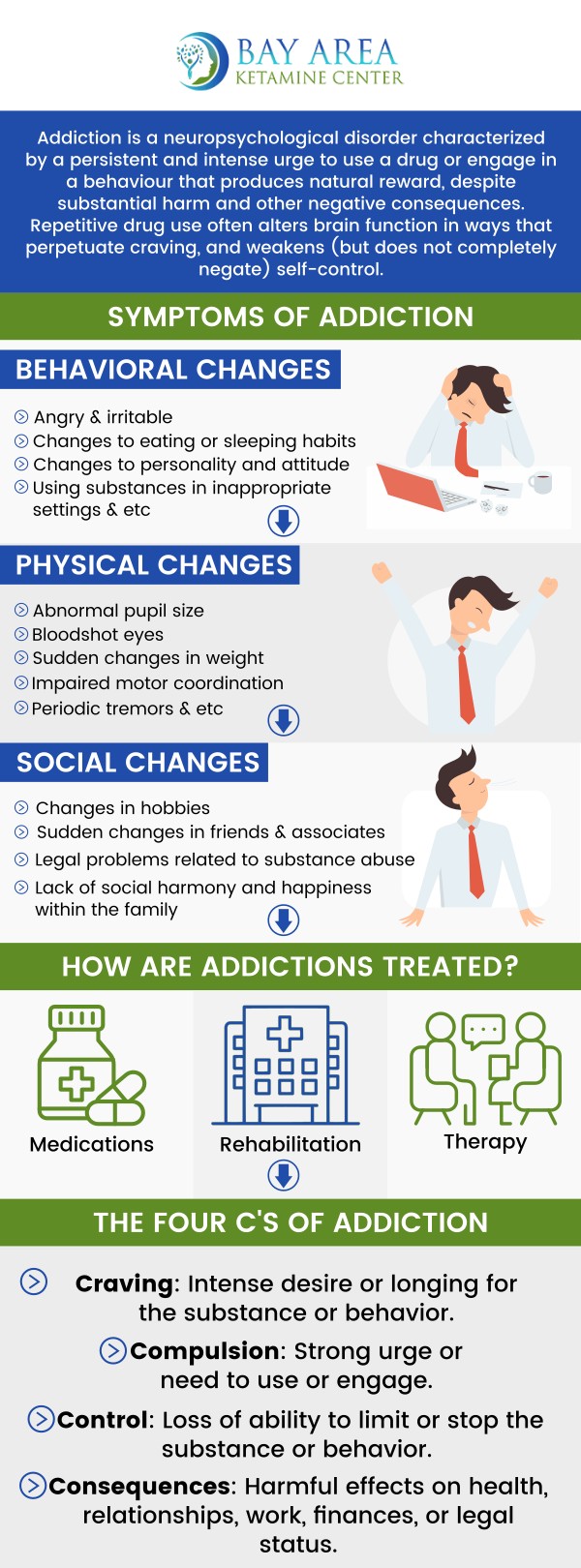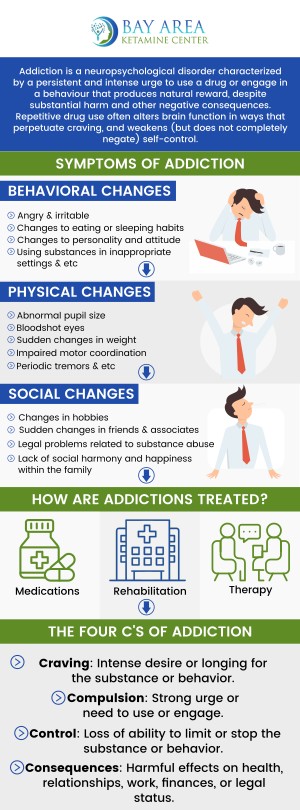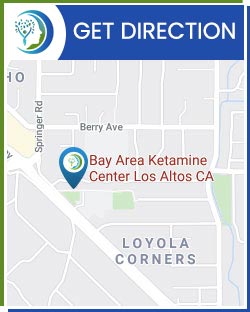Everything You Need To Know About Addiction
If you or someone you know is suffering from an addiction and hasn’t found a treatment that works for them yet, a new treatment using ketamine may be their way out. Speak to our experienced professionals at Bay Area Ketamine Center to learn more. Contact us today for more information or visit us to schedule an appointment online. Our clinic is conveniently located at 746 Altos Oaks Drive Suite B, Los Altos, CA 94024.




Table of Contents:
What is considered an addiction?
What are the different forms of addiction?
What are the causes of addiction?
Is ketamine a viable option for addiction treatment?
There are many different kinds of addiction treatments out there that yield a variety of results. If you or someone you know is suffering from an addiction and hasn’t found a treatment that works for them yet, a new treatment using ketamine may be their way out. Please speak to one of our expert medical professionals to see if ketamine addiction treatment is the right route.
An addiction can include any sort of habit-forming substance for which the user feels a compulsive need to use. It is most commonly associated with drugs, alcohol, gambling, and smoking, but it is possible to develop an addiction to almost anything that can form a habit. A situation in which you lack control, or lack the ability to not partake in a substance or behavior often is considered an addiction. Addictions can also cause people to abandon commitments to their addiction, or ignore their relationships and no longer care about the risks associated with the substance or behavior.
Three primary categories of addiction forms include behavioral addiction, substance addiction, and impulse addiction. Behavioral addiction encompasses addictive behaviors, some of which we are more familiar with such as gambling, sex, shopping, or video gaming, but includes any compulsive behavior in which the user gets a rush or “high” that is comparable to those who use an addictive substance. When someone is addicted to a substance, such as medications, alcohol, or illicit drugs, and develops a physical dependency on a specific chemical contained in the substance. An impulse addiction will often stem from an impulse control disorder, which causes someone to struggle to manage their emotions and actions. An impulse control disorder will often make someone more prone to theft, destructive behavior, or emotional outbursts.
These behaviors and actions can become addictive. These three forms often overlap, for example, someone with an impulse addiction might also suffer from substance abuse. All of these types of addiction often intersect with other mental health issues as well.
While there is no one simple cause for addiction for every case, there are a few factors that can make someone to be at an increased risk of developing an addiction. Generally, it is the environment and external factors which might encourage the initial behavior or use. These environments can be influenced by your mental health, your family’s beliefs and attitudes towards drinking or substance abuse, or exposure to a peer group that encourages the behavior. Once the substance or behavior has been initiated, there are many more factors that may cause someone to develop an addiction. Genetics plays a large role, as an increased risk for drug addiction can be carried through genes. This is why drug or alcohol addiction is more common in some families. Substance abuse will also often be used as a coping mechanism for those with mental health disorders such as depression, anxiety, PTSD, and ADHD, so those with mental health disorders are also more likely to develop a dependency on their substance of choice. If the substance or behavior starts at a young age, addiction is a larger risk due to the way that the substance or behavior has changed the development of the brain. It has also been shown that lacking a bond with family members such as siblings and parents could be another risk factor as it often entails a lack of supervision or support. Some substances are also just more addictive than others, so simply using one of the highly addictive substances could quickly lead to dependency.
The use of ketamine for addiction treatment is still fairly new, but it has yielded incredible results through numerous studies and has impacted the recovery from substance abuse for many people. Ketamine blocks the brain receptors that are responsible for forming memories, which works very well as a treatment for alcohol and drug abuse as it can essentially cause the brain to forget the trigger response that the brain has when the substance is used, helping to break the addiction cycle while in recovery. It works to basically override the memories that drive the addiction and substance use. As with most kinds of treatments, ketamine treatment for addiction is not for everyone and requires medical professional help to ensure that it is the right option for each case.
If ketamine addiction treatment sounds like it might be a good fit for you, please speak to one of our health care professionals to learn more. Contact us today for more information or visit us to schedule an appointment online. Our clinic is conveniently located at 746 Altos Oaks Drive Suite B, Los Altos, CA 94024. We serve patients from Los Altos CA, Sunnyvale CA, Palo Alto CA, Stanford CA, Atherton CA, Cupertino CA, Santa Clara CA, Mountain View CA, Loyola CA, and surrounding areas.

Check Out Our 5 Star Reviews







